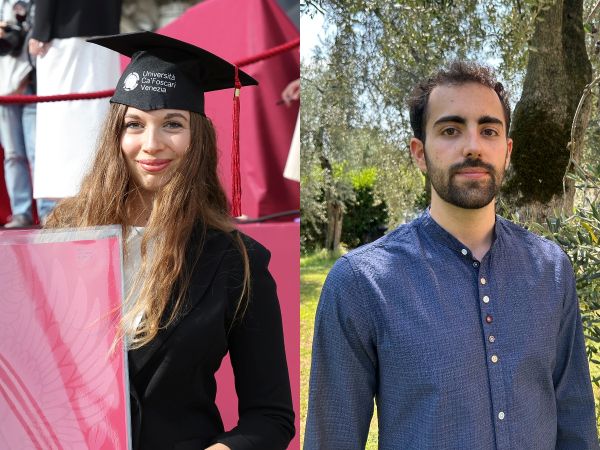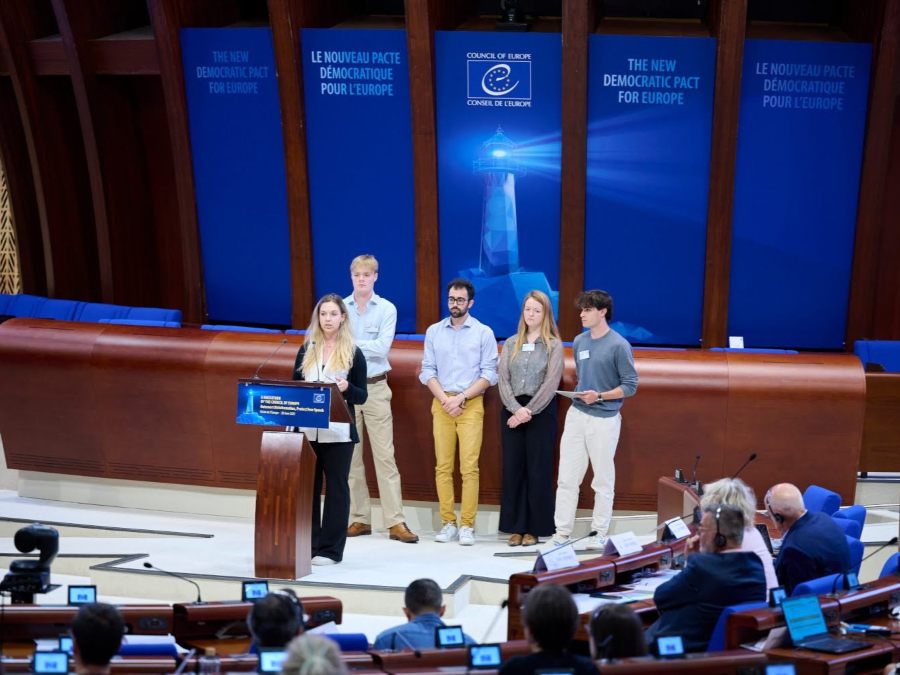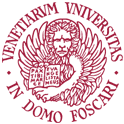From EUTOPIA Hackathon to the Council of Europe Podium: Benedetta and Gabriel Share Their International Experience

An idea born during a EUTOPIA alliance hackathon has landed on one of Europe's most prestigious stages.
Alongside their international team, Ca' Foscari students Benedetta Marchesin and Gabriel Vincenzi outperformed 284 teams from across the continent to secure second place at the "Democracy's Firewall" hackathon, organised by the Council of Europe in collaboration with Kreativdistrikt. Their project is an app that simplifies data and makes it publicly available, fighting misinformation with clear and verifiable tools.
It all started last May when Benedetta, an Economics, Finance, and Sustainability student (specialising in Quantitative Finance and Risk Management), and Gabriel, a recent graduate from the same Master's programme (Economics-QEM curriculum), took part in the third edition of the EUTOPIA 'Innovation Challenges for Students' call. Organised in Barcelona by Universitat Pompeu Fabra, the hackathon was titled "Unmasking the Truth: Tackling Fake News Together" and concentrated on the social and political effects of misinformation.
That intense experience, filled with workshops, ideas, and collaboration among students from across Europe, created a tight-knit group – the Sunflower Team – and a compelling idea: an application that gathers and processes open data from official sources on topics like the environment, population, and economy, making them straightforward and accessible for everyone. This aims to promote critical thinking and democratic transparency through a visual and context-based.
Here is a joint interview where they share more about their experience.
What motivated you to take part in the EUTOPIA hackathon?
Benedetta: "I found out about the initiative through an email from Ca' Foscari. I had already applied for the previous hackathon in Cergy, but the one in Barcelona had a topic more aligned with my interests and studies. The theme was incredibly current and immediately captivated me."
Gabriel: “The timing was perfect: I had finished my exams and was working on my thesis. I had never done anything like this before, so I decided to give it a go. As someone who studies economics and the economics of inequality, I am very interested in public policy, so the misinformation topic immediately caught my attention.”
How was your international team structured?
Benedetta: "There were five of us: Gabriel and I from Ca' Foscari, Natasha from Cergy, Alasdair from Warwick, and Manel from Barcelona. At first, it was somewhat tricky to balance our collaborative dynamic because we all have very strong personalities, but by the second day, we had already found our rhythm."
Gabriel: “The most interesting thing was that we all came from different backgrounds: some studied law, some computer science, some economics. It was really stimulating and pushed you out of your comfort zone.”
Tell us more about the idea you submitted.
Benedetta: "Our project was based on the use of open data and how it can aid democracy and combat misinformation, making both political and everyday decisions more informed. Our app idea simplifies raw data collected from government websites and presents it with clear, understandable statistics. This provides verified and unbiased information, helping people develop critical thinking skills, for example, to spot fake news."
Gabriel: “As we explained in our various presentations, it is not just an open-source project, it is also 'open understanding,' because with it anyone can comprehend the data, even if they're not an expert.”

What was the greatest challenge during the EUTOPIA hackathon, and what did you learn from the experience?
Benedetta: “Time. We had to develop a complex project in a very short amount of time. I learned to manage many micro-tasks directly and effectively. It was a truly stimulating experience. You have an active role from the outset, and collaborating with people who have different academic backgrounds and approaches to your own is a challenge. And you meet people from across Europe with whom you can build long-term relationships.”
Gabriel: “The hackathon format is very intense. But it teaches you to deal with new situations, to collaborate with strangers... it is a bit like the working world, in miniature. I'd recommend an experience like this to everyone, especially if you're passionate about the topic. It's a type of initiative I haven't seen at other universities or external organisations, particularly with the opportunity to be mentored by industry experts. The atmosphere was a wonderful mix of dedication to solving a global issue and working together in a collaborative environment.”
How did you end up at the awards ceremony at the Council of Europe in Strasbourg? Do you plan to continue your collaboration?
Benedetta: "About a month after our EUTOPIA experience, Natasha informed us of an initiative launched by the Council, also aimed at combating misinformation. We reworked the project, incorporated additional aspects requested by the call, and were among the 11 teams chosen for the event. It went really well!"
Gabriel: "We were fortunate to find a great group; we're cohesive and enjoy pursuing this idea, so why not explore other experiences! We were the only mixed international group. After the summer, we would like to continue refining the project and propose it to associations and universities in our respective countries."
Discover all the opportunities within the EUTOPIA Alliance and don't miss the upcoming call for 'Innovation Challenges for Students': www.unive.it/eutopia









